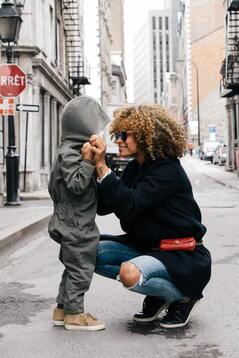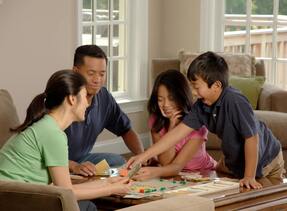|
Back to Blog
 Photo by Krakenimages on Unsplash Photo by Krakenimages on Unsplash Last month I discussed the insight I learned from my five year old child regarding oppositional behavior. This month, I'm going to share something else I became enlightened to. During the month of May, I was discussing celebrating Mother's day and Father's day and how, in our household, the mother and/or father get to do whatever their heart desires. Cue in my daughter who asks, "Is their a children's day?" My adult self immediately retorted, "everyday is children's day," but then therapist self came into the picture and realized the following: While it seems like everyday is children's day because children typically don't have to work, pay bills and care for children, the truth of the matter is children have just as much stress and exhaustion as adults. Think about it, in a typical school-aged child's life, they have to:
So, after my daughter's inquiry, I Googled children's day and wouldn't you know, there is a National Children's Day celebrated on the second Sunday of June. There is also an International Children's Day celebrated on November 20th. National Children's day is about recognizing children for how great they are and as well remembering that children are sometimes still exploited and also struggle for a variety of reasons including poverty. In recognition of National Children's Day, I want to provide a few suggestions on how you can recognize the greatness of your child. Here a few things to consider doing: 1) Play with them - whether you are playing a structured game with rules or letting them lead you into imaginary play, the goal is to have uninterrupted play where they are leading and have say over what's happening. I know this is a hard concept for many but check out one of my past blog posts to learn how to have more fun at least while playing board games. 2) Let them choose what they want to do - I recently watched a movie called Yes Day. The premise is that the parents are challenged for 24 hours to say Yes to whatever their children ask for. While I was at first skeptical and practical about the notion, after watching the movie it allowed me see how it could work. So, I challenge you to first watch the movie so you know what I'm talking about and then reflect on what you can incorporate in your household that will allow your child(ren) to feel like they are in charge. For me, I'm playing with the idea of having a Yes morning, afternoon or evening. Basically, a few hours where my child can decide how we are to spend it. Rules of course are allowed. ;) 3) Make a card for your child - isn't wonderful when we receive affirmation of how great we are? Kids love it as well. Perhaps you can draw them something or create a craft with them. Not creative? Head over to your local craft store (the Dollar Store work just fine) and pick up a painting kit or anything you can create for your child or with your child. Let go of the notion of it being perfect and just have fun with it. Need some other tips? Check out this blog post to learn more about showing your child love. Overall, anytime you spend with your child that doesn't have interruptions and allows them to show you who they are, is time well spent. It doesn't just have to be a designated day like National Children's day but having a designated day in the year helps to remind us to take time to show appreciation. Thank you for reading!
0 Comments
Read More
Back to Blog
 Photo by Paige Cody on Unsplash Photo by Paige Cody on Unsplash Ever since I started training to become a play therapist my perception of why children do what they do, especially when they are being oppositional, has changed. Recently, I had an experience with my five year old who had a two day surge of defiance. Our days went from mostly smooth sailing with sporadic refusals, to two straight days of complete refusal at everything I asked of her. Being the trained therapist I am, I first assessed for the following: 1) Have there been any recent changes in her routine? 2) Is she coming down with a cold? 3) Is she hungry? 4) Is she tired? Knowing that none were the culprit for her resistance, I was perplexed. I started to feel angry and resentful. My therapist part was telling me there was a reason for her behavior and I should be understanding but another part of me was checking out and wanted to be alone - away from her. Fast forward to a few mornings after and my spouse told me about a conversation she had with him. My five year old disclosed she was upset with me because... wait for it... "Mama wasn't getting mad!" :0 In other words, my daughter was trying to rile me up. Her defiance was meant to spark a strong angry reaction from me. Hence this blog post. While I'm generally a private person and don't like to share details of my life with people outside of my intimate circle, I did want to share my recent experience in the hopes it normalizes and validates what you and many parents experience at one point or another. So, what is the lesson to be learned from this experience? Children often want us to feel how they feel. And, if they don't think we are getting it, they will find a way to make us feel what they are feeling. In this situation, my daughter was trying to get me mad because she was mad. What she got from me instead, which I'm been working hard on and am proud of, was a calm, patient mom who validated her feelings but still told her she had to take care of her responsibilities. What she really wanted, however, was a mom who got upset because it would in some way validate her experience. Now this may sound confusing but here is an example my husband reminded me of - have you ever been so mad and upon telling someone how mad you were, they just turned around and gave you a calm, non-expressive response? Do you remember How it made you feel? Did you welcome their calm energy or did it piss you off even further? Chances are, it made you more angry and even a bit confused. Why? Because you may have felt like they were not taking you seriously or were being dismissive. This is what some children feel. So, does this mean we turn around and be mad at our kids? No, but we can be mad WITH them. We can join in their anger and perhaps share some of their energy so as to relate empathy. Here is what I tried and recommend: 1) Listen to what they are saying - after repeatedly telling my daughter, to brush her teeth, she replied, "I said no! Mama, you are making me so angry that I just want to fight you!" :0 Whoa! This statement triggered a strong reaction from me. 2) Detach from taking it personally - My vindictive part wanted to pull the parent card and show her "who's boss" while my compassionate part wanted to help her. So, I took a deep breath and channeled my compassionate part. This is the part of me who doesn't see her statement as a threat/challenge but instead as a need. What was the need? I didn't know at the time, but I knew that continuing to push the issue of brushing her teeth wasn't the answer. The deep breath I took allowed me to disconnect from my own anger and frustration and remind myself that I'm dealing with a five year old who is still trying to make sense of the adult world around her. 3) Get playful - After coming to my logical senses, I realized I should try engaging her in a playful way that may help regulate her anger. I furrowed my brows, lowered myself to her level, made eye contact and said, "You want to fight me huh? Okay, come on, fight me. Let me see how much you can push my hands." I placed my open hands in front of her and let her push them. I pretended she had so much strength that she was able to "push" me backwards. I said things like, "Oh wow, you are really pushing me. You are so strong and so mad." I then pretended to fall to my knees, which made her laugh thereby giving me permission to laugh. That then turned into some light tickling and led to some hugs. As I was hugging her, I then walked her into the bathroom and put the toothbrush in front of her. The result? She ended up brushing her teeth with no resistance. Yay!!! (Side note: I then collapsed on my bed and took some time to regulate my system). While I realize it takes energy to embrace our playful side, put aside our agenda and our pride, I am the first to admit that moving forward, I will continue to assess her need and try to get playful first. Again, this isn't possible every time but it is doable and it works. I would love to hear your comments and/or address any questions you have. Feel free to share them below. And as always, thank you for reading.
Back to Blog
How Can I Show Love to My Child? Part 34/14/2022  Photo by Katrina Wright on Unsplash Photo by Katrina Wright on Unsplash In the last of my three part series, this blog post features ways parents/guardians can show love to their child through words of affirmation. For those of you familiar with the 5 love languages, the concept behind words of affirmation is basically to verbally express how much we love and appreciate our loved one. For kids, it can look a bit different depending on the age but here are a few suggestions that can be playful. 1). Write a note/draw a picture - in case you've missed it, food marketers now sell snacks with wrappers you can write on. See what I'm referring to here. These opportunities to write or draw a picture for your child while you are away from them can reassure them that even though you are apart, you are still thinking about them. Don't want to buy these kinds of items? I hear ya! Use post-it notes or good old-fashioned paper and tape. It's not about the item vs the note/drawing. 2). State what you love about them - during lunch/dinner or bedtime, finish the following statement: I love your________ (eyes, ears, smile, laugh) because _________ (your eyes sparkle so bright, your ears hear so well, your smile lights up a room, your laugh is so contagious). The purpose behind making such a statement is to highlight the greatness of your child. Avoid commenting on what they are wearing or how their hair look. Instead, focus on who they are. This can take some practice to get used to doing but with practice it is doable. If you find yourself struggling with this one, simply state what you notice about them. For example, I love your brown eyes!, I love your big smile., I love your loud laugh. 3). Sing a Song - for some parents, it can be hard to verbally express their love directly. This is where singing and dancing can come in. Under the guise of the lyrics in the song, a parent/guardian can lip-sync the words of the song to the child. The key to doing this is to make sure you are looking and pointing to your child so they know you are "singing" to them. Depending on your child's age, a lullaby can also help; Think, Twinkle, twinkle little star. 4). Acknowledge their attempts - while it is important for us to acknowledge success in our children, it is equally important to acknowledge the attempts they make in trying to to be successful. For example, you want your child to complete a task, he/she tries a couple of times but gives up because they get frustrated. Instead of focusing on them giving up, acknowledge the fact that they tried to complete it and it was very hard. Recognizing this frustration and how hard it was for them is crucial because it validates their desire and willingness to try. The next few steps can be a little tricky depending on the task but offer them an opportunity to take a break from the task so they can regroup. After some time, check in with them and let them know it is time to try again and that you will be there to help if they want it. Word of Caution: being able to verbally express yourself as a parent/guardian requires your patience and insight into knowing what you are capable of giving. It will also require you to not expect anything in return from your child. Words of affirmation are meant to celebrate your child's greatness. If we go in expecting our child will also say pleasant things about us, then it will change the nature of the interaction from one of unconditional love to conditional love. Well, that wraps up the three part series that focused on how to show love to your child. Need a refresher? Missed the earlier posts? No problem! For games that focus on "seeing" each other, click here. For games that focus on touch, click here. Have any questions or suggestions? Feel free to let me know. Thank you for reading.
Back to Blog
How Can I Show Love to my Child? Part 23/15/2022  Photo by Sai De Silva Photo by Sai De Silva In February's blog post, I mentioned how difficult it can be to show affection and love to our children as they get older. And to be clear, when I say get older, I´m referring to children who are no longer infants. Such children are now more vocal about their needs, expressive with their discontent and can reject us in ways that sometimes trigger us. In that blog post, I highlighted four games that focus on eye contact that can bring a sense of connection and joy between you and your child. Check it out here if you haven´t already read it. This month´s post will feature games that emphasize touch. Why is touch so important for a child and for us as human beings? Aside from the research that highlights how infants actually thrive when touched, nurturing touch allows us to feel connected and loved. Try to remember the last time you received a welcoming, embracing hug from your child or another loved one. Or the time you held your child's hand to stroll down the street. Or, how about the last time you got a high five or a fist pump with a proud energy behind it? These are the touches I'm referring to. They come with loving energy that helps us connect with each other. Unfortunately, however, these are some of the first things we can forget to do when life gets busy and our children become more independent. So, below are a few games/activities you can do to help foster this sense of connection. Test them out and feel free to let me know how they worked for you.
As in my previous post I will offer a word of caution: some children are sensitive to touch. For some, touch can be too ticklish which can dysregulate them. For others, the proximity of having someone close to them may be triggering. If you find your child is not playing along and instead tries to hit you or to turn it into a different game, it could be a sign that they are uncomfortable. Try instead the eye contact games I mentioned in my previous post or if you believe it is better, don't play at all. Stay tune for next month's post where I will be sharing activities that focus on words of affirmation. Thank you for reading.
Back to Blog
How Can I Show Love to My Child? Part 12/12/2022  Photo by Bruno Nascimento on Unsplash Photo by Bruno Nascimento on Unsplash Love, according to the Oxford dictionary, is "an intense feeling of deep affection." As a parent, we all have love for our children but learning how to show that love can be a challenge as our children grow older. Over the course of the next three months, I will provide tips on how you can show your child how much you love him/her through games. This month's post will focus on games that facilitate making eye contact. Looking into your child's eyes is a form of non-verbal communication that is intimate and can be intense. Games, as I've mentioned before, can help facilitate the process of connecting and re-connecting with our children. This is especially true when we feel like we are losing touch with who they are and don't know how to best interact with them. A few games that can help both of you reconnect include:
A note of caution: Some children can become uncomfortable making eye contact due to various issues. If you find your child is not engaging in the games I mentioned, don't push the issue. Just work around it if possible or if you believe it is better, don't play at all. Aside from playing games, I would also encourage you to make a conscious effort to notice what your child's eyes/face looks like when they are eating, coloring, doing homework or even watching their favorite show. Such moments happen so often during the day but we often forget to check in and see what our child looks like as they are growing. Doing so can help remind us about the important things in life. Stay tune for next month's post where I will be sharing games you can play that focus on touch. (Hint, hint - handclapping games!) Thank you for reading.
Back to Blog
How Do I Hold It Together?1/13/2022  Photo by Nik Shuliahin Photo by Nik Shuliahin There's no denying that two years into the pandemic, many of us are feeling exhausted, overwhelmed, spent. Whatever word you use, the end result is we are stretched thin and have very little to give. One area of concern I often hear from parents is wanting to give more to their child but not having anything left as they are barely holding it together. If you are such a parent, read on for some tips on being able to hold it together. 1) Acknowledge that you don't feel safe - Let's face it, questions like - do I or my kid have COVID? Will my child(ren) be in person or virtual next week? Can we go visit our family and friends? - is anxiety provoking and draining. This constant questioning comes from the unpredictability of our situation right now. This same unpredictability make us feel threatened and/or unsafe, which in turn can often spark feelings of anger, sadness and fear. And chances are if you are feeling this way, your child may also feel the same. So first step, acknowledge that you are feeling what many other human beings are feeling - scared and unsafe. 2) Identify and Name your Emotion - identifying and naming how you feel can be extremely helpful in being able to "keep it together." As adults, we often don't allow ourselves to pay attention to how we feel and fess up to it. I'm talking about feelings like sad, mad, scared and worried - core emotions we all experience as humans. Engaging in distracting responsibilities like work, school, cleaning, etc., is something we often do to ignore how we feel. Unfortunately, doing so ultimately does a disservice to your mind, body and spirit. 3) Express Yourself - another key to holding it together, is ironically enough, letting your feelings out. Doing so can look like talking about your feelings to someone who can validate you instead of dismissing you. It can also look like energetically releasing the emotion. In other words, do you slam something or scream when you are angry? Cry, sing or lounge around when you are sad? Expressing your feelings verbally or physically can be a great way to make sure your feelings don't get stuck. Not sure where to get started? I often recommend hitting pillows, couches or beds with a pool noodle. Squeeze the heck out of a squishy ball. Do you our your child have fidget toys? If so, feel free to play with any fidget that may be throwable and squeezable. These often can be used to release anger. For feelings of sadness, try staying in your pj's/comfy clothes all day, order in, and/or indulge in your favorite show. This last one can be done with or without your child - whatever allows you to feel connected with yourself. Need a good cry? Cue up the music that makes you ball and have a good deep cry. Journaling your emotions can also help with feelings of sadness and anger. In summary, this time we are in truly sucks! There is so much unpredictability and when we don't know what to expect, it messes with our sense of safety. Aside from getting triggered, let's not forget the parent guilt that hovers over us especially when we see our child(ren) suffering. As a human who is caring for another human be kind to yourself and know that being able to take time to read this blog shows you are already on the path of "keeping it together". I wish you strength and compassion on your parenting journey. Thank you for reading.
Back to Blog
It's (Almost) a New Year and I Want To...12/23/2021  Improve my self-esteem. Work on my personal relationship(s). Have more fun with my child(ren. The list can go on and on. Regardless of what is on your Resolution list, it is important to remember there are certain aspects that must hold true in order to increase your chances of success and reduce the likelihood of failing to achieve your goals/desires for this year. 1). It Must Come From You- many of our intentions for change originate from good places but they are not often our own. In many cases, they can be other people's recommendations or beliefs of what we should be doing, what we should look like, how we should be living our life and/or what kinds of relationships we have. And while you may want to pursue such changes, unless you truly have the desire to embark on the journey for yourself, the chances of success can be minimal. Therefore, take some time to reflect on what you feel you have the energy for. 2). You Must Have a Plan - Once you identify what YOU want to work on, you then decide how you want to get there. Devise a plan that is realistic with the pursuit of your goals by sitting down with a pen and paper and answering these questions: - what do you specifically want to improve? - why do you want to improve? - how can you make it happen? Not sure how to make to happen? I personally find inspiration from listening to how professionals and non-professionals are navigating their journey. My favorite go to that fits into my mom life is podcasts. Searching for keywords and looking for episodes in the podcast app can be extremely helpful. 3) You Will Need Perseverance - Any aspiration worth attaining usually takes "blood, sweat and tears." In other words, hard work, dedication and routine are usually required. When you find yourself exhausted, wanting to quit, refer back to your list of reason(s) for pursuing your goal(s) and review your plan of action. Your plan may need to be modified based on what you have learned about what works and what doesn't. Sometimes modifying the plan can help to reinvigorate your motivation. Overall, time and patience are required to reach your goals. And by time, I mean, time to get a handle on what does and doesn't work for you. And when I say patience, I mean, not being hard on yourself because you couldn't get from point A to Z within a given timeframe. Good luck on your 2022 ambitions and be sure to leave a comment if you have questions or need resources.
Back to Blog
 Photo by National Cancer Institute via Unsplash Photo by National Cancer Institute via Unsplash Of the many things I love to do, playing board games is one of them. Monopoly anyone??? Playing adult games when you are an adult can be fun and exciting, but playing kids games as an adult can be tricky. Depending on the age of your child, it can elicit feelings of boredom, frustration and competition. In order to avoid this, it is vital to be aware of the potential blocks that can turn a fun, bonding experience into a stressful one that the child and family ultimately avoid. Below are 5 ways to help make playing games a fun, interesting and family bonding experience. 1). It's Not About Winning - at least not on the part of the parent/guardian. Playing a board game should be primarily about the child winning. Now, you may be thinking - "But Christine, how will my child learn not to be a sore loser or about the facts of life, if I let them win?" I hear you and I'm here to say - if you are trying to foster a stronger connection with your child, that starts with you being able to let your child win at a board game. Hear me out....winning a game is more about the child feeling they have a sense of mastery. This is something they rarely get a chance to feel, especially in relation to adults. Allowing them to feel like they are beating you, can make them feel like the King/Queen of the World - and let's face it, we all want to feel like we have conquered something. Plus, you will also be showing them how to lose fairly. So, play your best but be sure to not make it about you winning. Also, this doesn't mean you don't win at all. It just means that we want our children to know how amazing it feels to beat someone who seems stronger than you. 2) It's Not About Teaching - another area where I see some parents/guardians get too focused on is trying to make the game a teachable moment. Playing a game with a child should be about the fun of it vs. using it as an opportunity to have them recite their colors, showcase their reading skills and/or define words. Now, if your child offers to do this, then awesome, take their lead. But, be sure to bring it back to the play zone. Your child will have enough time in life to learn. 3) It's Not About Following the Rules- playing games do have rules but this is not the time we have to be a stickler about the rules. Depending on the age of your child(ren), you will have some children that are all about the rules but children younger than six typically just want to play the way they feel like. As long as any other child who is playing is on board to do the same, then just go with the flow. 4). It IS About Having Fun - playing games is about laughing, smiling and connecting during the time you are with each other. When we can learn to let go of what we think game play should look like with a child, and allow our child(ren) to lead, we can end up having a lot more fun. 5) Choose Enjoyable and Non-complicated games - games I often recommend and even have in my household and office include the following - Candy land, Connect four, Memory/Matching cards and Charades. I personally love a charades game called Kids on Stage. This game allows kids as young as three to play and reading is not required. I've even had adults play this game too and it can be hysterical. Some other games I would recommend for kids 7+ include Pictionary, Guess Who and Jenga. These games can also be played with younger kids but you will really need to flex the rules. Thoughts? Questions? Feedback? Leave them in the comments below.
Back to Blog
I'm Back!9/30/2021 Welcome back to my blog and thank you for reading. After taking a hiatus due to COVID and mom duties, I'm happy to say I am now in a place where I can give back to my readers.
So, what has changed? 1) I am now primarily virtual - upon the pandemic doing what it did, I decided to move my practice to all telehealth so that I can continue to be of service to my clients. Fast forward a year and a half later and I'm still providing therapy virtually to my adult clients. Some exceptions are being made for children under 11. 2) I now work with children ages 3-11 - this has been the biggest shift for my practice and it has bought me full circle to how I intended to begin my career as a social worker. To learn more about the work I do with children, click here. 3) I also work with parents/guardians - in order to help the children I work with, it also makes sense to help guide the parents/guardians too. I mean, who else is going to help that parent/guardian manage the embarrassing public tantrums that we have all been witness to, and let's admit it judged, in the supermarket. ;) 4) I became a Mom - Five years ago I gave birth to a child who is the primary focus of my world - especially when we are dealing with a global crisis. As a result, I took time away from my blog and focused on adjusting to this new life role while also managing my home life, my mental well-being, my practice and the clients I work with. So, that is it in a nutshell. My practice is focused primarily on working with children and families but I still also love working with adults who are family caregivers, are coping with Multiple Sclerosis and/or as well as other daily struggles. Moving forward, I expect to distribute a Monthly Newsletter and continue adding to the blog. Be sure to sign up here. Thanks for reading! Christine M. Valentin
Back to Blog
 Photo by Thomas Kolnowski Photo by Thomas Kolnowski Structure is something many of us need and may thrive off of. Nowadays, however, our routine and structure have been thrown out of whack. This disruption can leave parents and children feeling frustrated, anxious and overwhelmed. Creating a schedule, as mentioned in my previous blog, can help reduce our stress by making things more manageable. Knowing where to begin, however, can be a challenge. Below are tips that can help you get started. 1) Get Your Child(ren)'s Input - A key factor in getting kids to adhere to a schedule is getting their feedback about what they would like included in the schedule. Ask your child(ren) for one to three things they would like to do each day or during the week. Once they make suggestions, have a discussion on whether they can be included and when to include them. Based on their age, the depth and length of discussion you have will vary but ultimately the goal is to give your child(ren) a chance to voice their opinions and desires. 2) Include the Basis and Must-Haves - all schedules should have the basics like mealtimes (i.e. breakfast, lunch and dinner). Snack time and nap time can also be included, depending on your child's age. Must-have activities/tasks will also vary but essentially can include things like school work, reading, playing, gaming and/or screen time. I'm also a big advocate for family time. Even though most of us are home with each other all day, that does not equate to us spending quality time with each other. Family time, whereby every one is doing the same thing and interacting with each other (not their devices), can either be done with mealtimes or separately in an activity like movie night. 3) Try to Align All Schedules - When trying to determine the times for each activity/task, aim to match them up to what you have going on. In other words, are you in meetings most of the morning while your child(ren) are learning at school? Is your younger one not in school but you still have meetings to attend? Choose activities/tasks your child(ren) can do without your need for assistance or that keep them distracted enough so that you can accomplish what you need. When you are free, perhaps that is when you can schedule activities/tasks that require your involvement. 4) Be Realistic & Flexible - creating a schedule is meant to serve as a guide, not the end all be all. Given our current circumstances, it is unrealistic to believe everyday will go as planned. Being flexible can entail switching activities/tasks around. For example, if screen time is usually in the afternoon but you are having a stressful morning or have an important meeting, then change it. Let your child(ren) know that the change is occurring for a particular reason so that they know it is not permanent. 5) Make it fun - creating a schedule by hand, on poster board, construction paper, computer paper, or whatever you have around the house can be a fun way to get everyone involved. Painting the background, adding stickers, using crayons and/or markers can be a great way of enhancing the experience and increasing the chance of your child(ren)'s adherence. Do you have other questions about creating a schedule for your child? Having a hard time getting your child(ren) to adhere to the schedule? Feel free to email me directly for some recommendations. I can be reached at christine@cmvalentin.com. Be sure to include age of child(ren). |
This Site is not intended to provide psychotherapy advice. The Site is intended only for use by individuals in search of general information of interest pertaining to anxiety, depression and related topics. Content is not intended to replace or serve as substitute for professional consultation or service. Contained observations and opinions should not be misconstrued as specific counseling advice.
